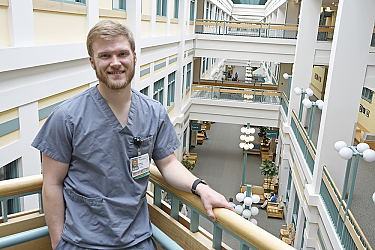The rigor of the scientific method in the context of Landmark College’s innovative teaching methods
Hands-on scientific inquiry is one of the most exciting and meaningful ways to learn, and that is particularly true for students who learn differently.
The principles of scientific investigation form the foundation of the Associate of Science in Life Science—and, as with all our other academic programs, the Life Science program is integrated with the College’s proven program to develop effective learning strategies and assistive technology skills.
The curriculum promotes scientific literacy, stimulates intellectual curiosity, and fosters an understanding of the role and relevance of science in the modern world.
The program is housed in the Nicole Goodner MacFarlane Science, Technology & Innovation Center, completed in August 2015. Facilities include several fully equipped laboratories, a preparatory room, and a number of dedicated science classrooms
Learn more:

